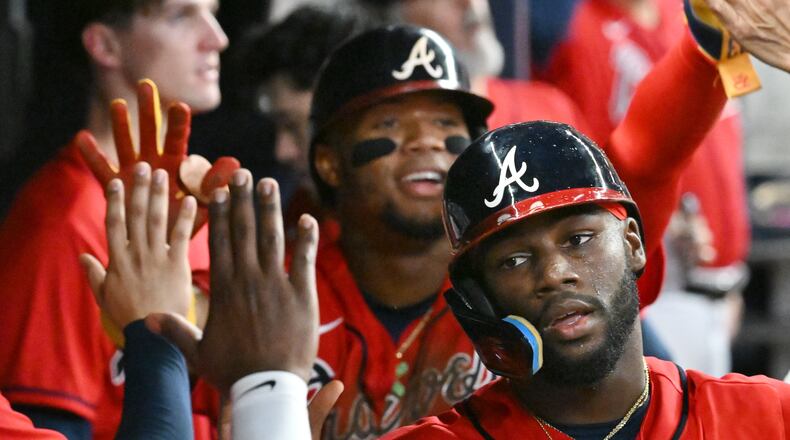Two months ago, the Braves were still trying to figure out roles for outfielder Michael Harris and pitcher Spencer Strider. Harris since has become one of the most valuable players in the lineup. Strider is favored to be voted National League Rookie of the Year. And recent call-up Vaughn Grissom has filled in capably at second base.
The Braves are a very good team that relies heavily on young players. That’s a credit to, most of all, those players. The organization’s scouting and player development also deserves praise. The Braves are set up to contend for years to come. What it means this year is they’ll try to become one of the youngest teams to win a World Series.
The average age of Braves players is 27.7 years old, per Baseball Reference data (weighted by games played). The 1969 Mets (average age of 26) are the youngest team to win a Series during the divisional era, which began the same year. The next-youngest team on the list is the 2016 Cubs (27.4), followed by the 1990 Reds (27.5).
Three Series winners during the division era had an average age of 27.7 years, like this season’s Braves: 2003 Marlins, 1972 Athletics and 1971 Pirates. If the Braves win the Series this year, they’d be the youngest team other than the 2016 Cubs to do so since MLB added two wild cards per league in 2012. The Braves are good enough to do it even though they are younger than last year’s Series champion.
Circumstances might explain why younger teams don’t win championships as often as they did in earlier eras of baseball. The recent trend in MLB is for teams to leave talented young players in the minors for longer to manipulate service time. Also, midseason trades typically make contending teams older because the players they acquire usually are older veterans. Good teams usually fill important roles with players who’ve been above average or better for a long time.
The Braves have players who fit that bill: Charlie Morton, Kenley Jansen, Matt Olson and Dansby Swanson. They also have young players who already are accomplished because they were good so early: Ronald Acuña, Ozzie Albies and Max Fried. The Braves won the 2021 Series with a relatively young team (average age of 28). Some roster changes since then made the team even younger.
Adam Duvall, 33, played center field for the Braves during the 2021 postseason. Duvall won’t play in this postseason because of wrist surgery. Duvall had moved to the corner outfield positions after Harris was called up. Harris, 21, has provided good defense and offensive pop for the bottom of the order. The Braves will ask him to do the same in October.
Joc Pederson and his pearls were in right field for the Braves last fall. He plays for the Giants now. Acuña was on the injured list for the second half of last season. He’s healthy now and has a good track record over 94 plate appearances in the postseason: 12 extra-base hits among 21 total, 12 walks and an .872 on-base plus slugging.
Freddie Freeman was 31 years old at the beginning of last season. He’s been replaced at first base by Olson (28). The few times the Braves needed a designated hitter last season it was Pedro Sandoval (35) or Jorge Soler (29), the World Series MVP. The DH is universal this year. Manager Brian Snitker started off using Marcell Ozuna (31) in that slot, but he hasn’t produced. Lately the DH usually is William Contreras (24) when he’s not the catcher or Eddie Rosario (30) when he’s not in left field.
The top three Braves starters for the 2021 postseason were Morton, Fried and Ian Anderson. Morton and Fried will give it another go. Anderson is in the minors trying to rediscover his form. In this postseason it’s possible that Strider (23) and Kyle Wright (26) will get the call before Morton (38).
The newest Braves clearly are talented players. They are performing well now. They just don’t have a long track record of doing so in the majors. My bias as a numbers guy means there’s always a nagging feeling about small samples in the back of my mind. Maybe I’m wrong to still wonder whether the least experienced Braves can keep it up through October, but I think there are good reasons for that feeling.
For Strider, it’s his reliance on two pitches, a (fantastic) fastball and (very good) slider. He just surpassed 100 innings pitched for his career. Harris has a very low walk rate, and an unsustainably high percentage of the balls he’s put in play have gone for hits. Contreras hits a lot of ground balls, and an unusually high number of his fly balls have gone out of the park. Grissom has only 59 plate appearances, though it’s been impressive to see how he adjusts during games once he sees how pitchers are trying to get him out.
It will be fun to see what the newest Braves will do in the playoffs. The 1969 Mets were boosted by the many young players on their roster. They were carried in the Championship Series victory over the Braves by hitters Tommie Agee (26), Cleon Jones (26), Wayne Garrett (21) and Ken Boswell (23). Mets pitchers Tom Seaver (24), Jerry Koosman (26) and Gary Gentry (22) were great in the World Series against the Orioles.
That team was known as the “Miracle Mets” because they beat long odds to even make the postseason. The Mets trailed the Cubs by 10 games in the NL East with 49 left before winning the division by eight. It wouldn’t be such a surprise if the 2022 Braves go on to win it all. They just did it last year with many of the same players.
The Braves will try to do it again with a better team that’s counting on more young players to produce.
About the Author
The Latest
Featured

